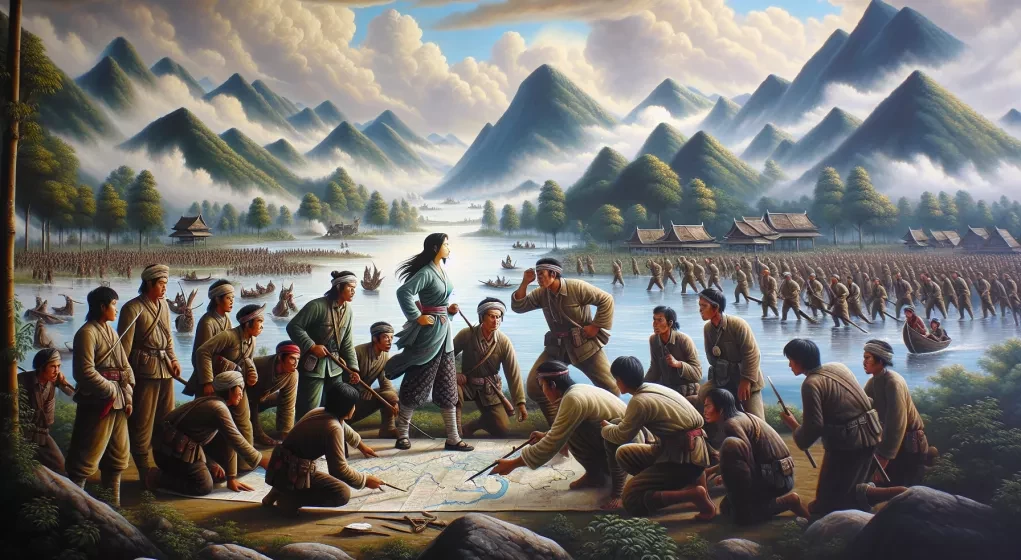In the shadowed realm of Shan State, a seismic shift upended the clandestine empire long shielded by greed and bullets. As dawn birthed a new horizon upon the notorious Laukkaing, whispers of a revolution began to echo through its once-corrupt streets. In a brazen act of defiance, an unlikely alliance of rebels had made their stand against the iron-clad grip of the Chinese mafia that had once rendered the town virtually impenetrable.
The ground began to tremble beneath the casino haven, not from the roll of dice nor the clatter of chips, but from the march of determined warriors—a coalition of regional ethnic minority groups and valiant pro-democracy fighters. As the last leaves of October fell, they descended upon key towns along the Chinese border, day by day tightening their hold and severing routes once flush with illicit trade. Their clarion call was unmistakable—the dismantlement of Myanmar’s oppressive military dictatorship, a regime as enduring as it was ruthless.
In the heart of Laukkaing, their liberation unfolded with cinematic fervor. Trafficked souls, once shackled to the fraudulent whispers of scam call centers, breathed the air of freedom as their chains were struck asunder. Members of the infamous “five ruling families”—Mafia warlords a law unto themselves—were wrenched from their fortresses of power and delivered into the awaiting arms of Chinese authorities. These families, once bolstered by the tacit support of Myanmar’s military junta, found themselves relics of a fallen dynasty.
China’s state media would later reveal haunting images—handcuffs binding the next in line, Ming Guoping, and his descendant, Ming Zhenzhen, the progeny of the now-deceased warlord Ming Xuechang. But their patriarch’s fate was but a footnote to a greater tragedy. Back in October, a band of trafficked workers, as desperate as they were brave, sought to flee Ming’s notorious Crouching Tiger Villa. Their bid for escape was met with the unforgiving roar of gunfire, some falling before they could taste the freedom they so gallantly sought.
This bloody tableau proved the kindling to an already smoldering tension between the authorities and the Mafia’s might. Arrest warrants spread like wildfire, the inevitable backlash against the Mings’ reign. Such was the spark that ignited the fervent rebellion.
The ties that once bound China to Myanmar’s junta—supporting its seizure of power in 2021—frayed like the edges of a once-cherished flag, signaling a covert nod to the rebels’ cause from a nation unlikely to overlook transgressions at its doorstep. It was a harbinger of dark times for the junta and the nefarious casino warlords once sheltered beneath its wing.
This tale of Laukkaing’s rise and fall would be incomplete without the specters of the past—of Peng Jiasheng’s rule before his downfall in 2009 and subsequent exile, breathless on Chinese soil at the ripe age of ninety-one. It was Bai Suocheng who rose, a turncoat to his former master and a staunch benefactor of the Myanmar regime, indulging his voracious appetite for power through casinos and vice, even as he presided as the chairman of the greater Kokang autonomous region.
Yet even Bai’s saga, woven with shadows and greed, seemed to reach its denouement as unconfirmed reports surfaced of his capture—attempting to flee the sundered realm that once hailed him king, now allegedly entrapped by the very military to whom his loyalty was pledged.
Thus the storm subsides in Laukkaing, its very sinews reshaped by the fervor of rebellion, a story that lingers in the air like the promise of a new tomorrow. Serenity now graces a town reborn from the ashes of turmoil—a narrative etched deeply into the annals of a land perennially entangled with the silken threads of intrigue and liberation.






